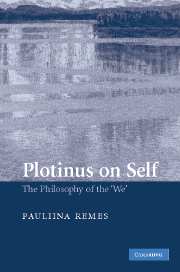Conclusion
Published online by Cambridge University Press: 26 October 2009
Summary
In literature since Plato, the city-state has served as an influential analogue and metaphor for the soul and the self. Here is a version of the metaphor from contemporary scholarship that illuminates two different understandings of the self: on one view, the self is like a carefully planned and centrally organised city at the centre of which are the judicial, executive and administrative branches of government, all acting from a single set of rules. Radiating from the centre are broad boulevards. Power emanates from the centre to the city, and all the way to its outskirts. The analogy shows the self as essentially rational, unified, self-transparent, and governed by one single thing, the rational centre. This view is often attributed to Descartes and it colours many interpretations of Plato as well as Plotinus.
The medieval city is very different. Like Paris in ad 1250, it consists of guilds, grand families, religious orders, and old village centres. Such cities were loose confederations of semi-autonomous neighbourhoods, each defined by a distinctive internal organisation and distinctive procedures for foreign relations. There may have been a loose central organisation as well as attempts towards city-planning, but these functions were much harder to delineate and describe than the ones in a centrally governed and planned town. Analogously, the other understanding of the self is a complex layered configuration of many parts, dimensions and possibilities.
- Type
- Chapter
- Information
- Plotinus on SelfThe Philosophy of the 'We', pp. 254 - 257Publisher: Cambridge University PressPrint publication year: 2007



